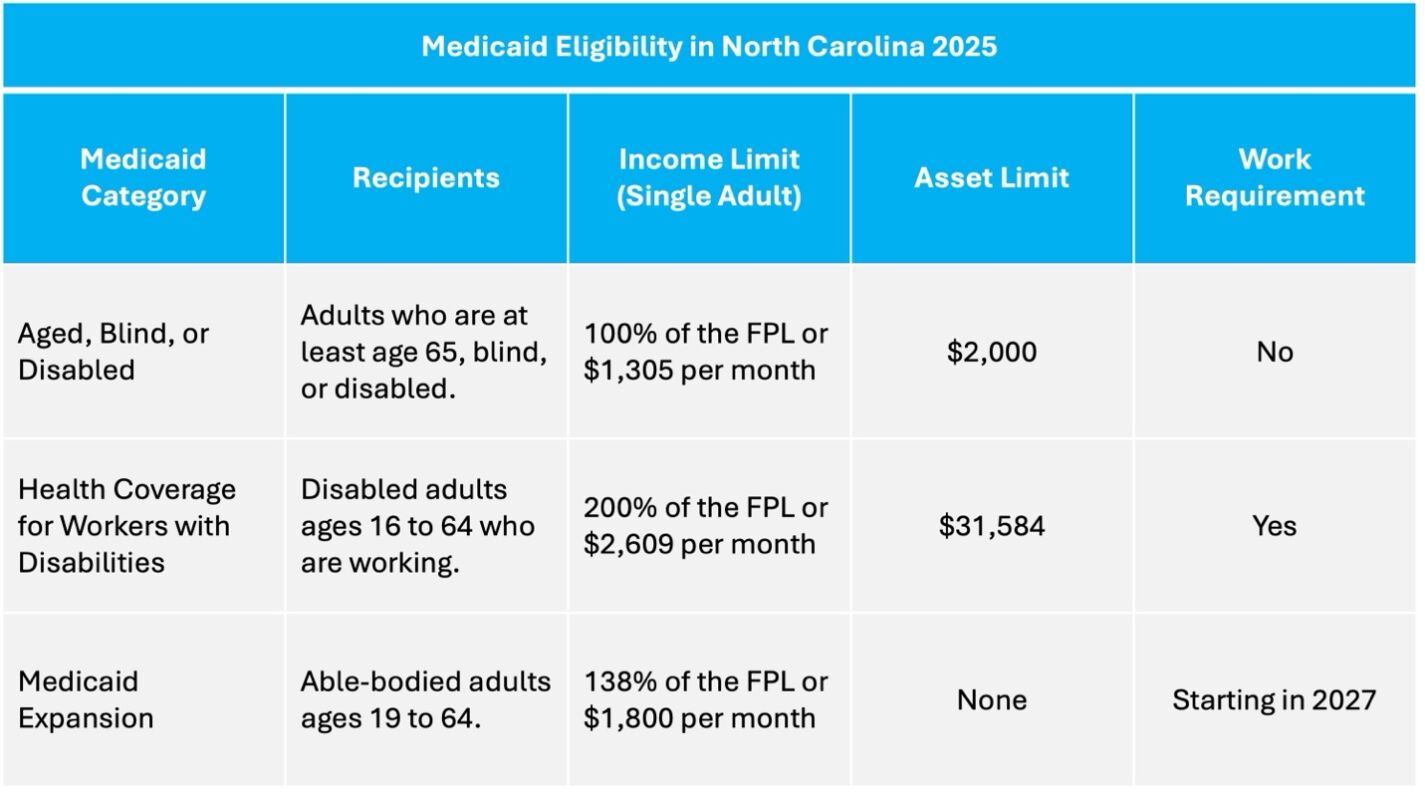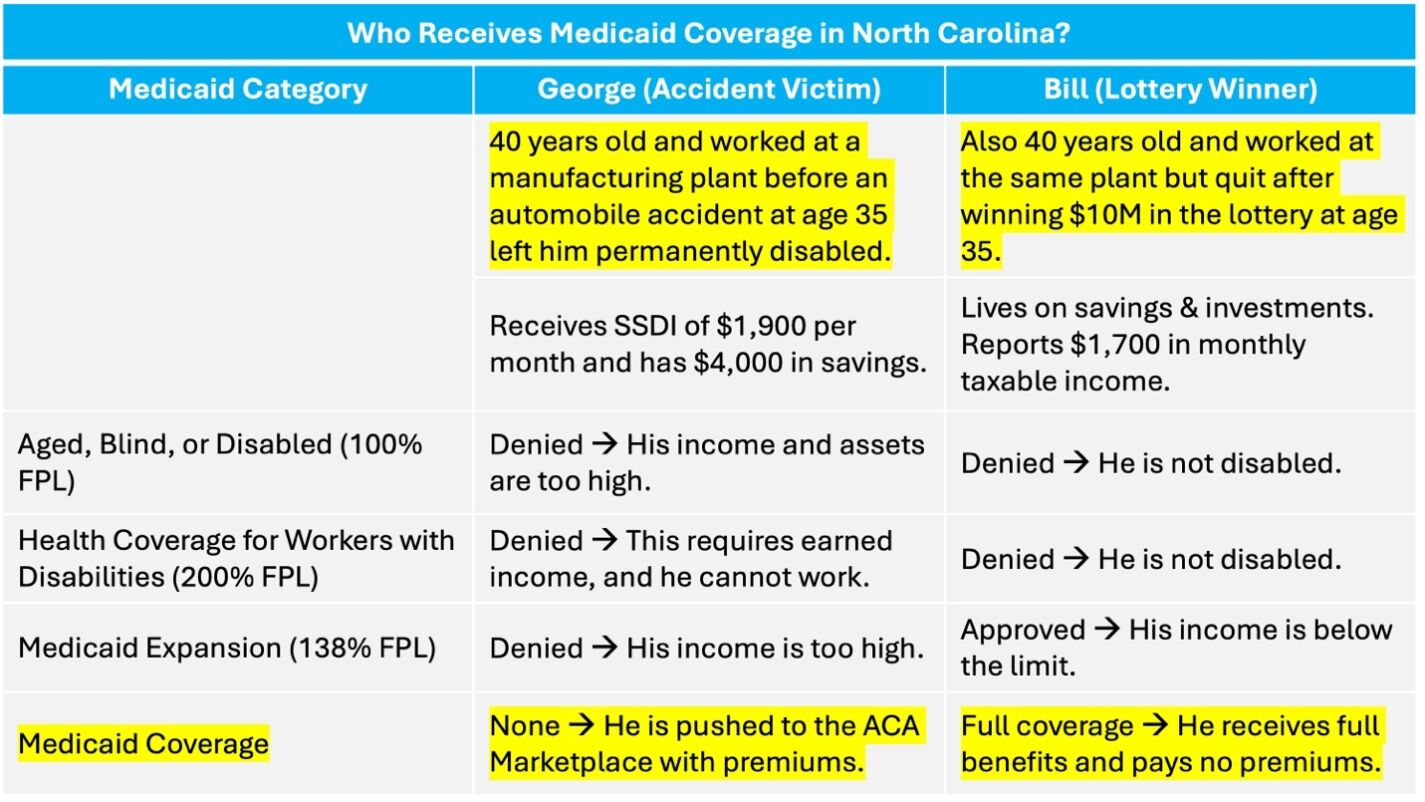To date, North Carolina is the latest state to adopt Medicaid expansion. It should also be the first to repeal it. By design, expansion ignores assets, allowing even the wealthiest individuals to qualify so long as their reported income is low enough. Meanwhile, the vulnerable groups that Medicaid was designed to serve, such as the disabled, are subject to asset limits. In this system, fairness is inverted.
Medicaid eligibility requirements
When Medicaid was established in 1965, it was designed to pay for health care for society’s most vulnerable members under strict eligibility requirements. Over time, however, policymakers have extended coverage to more privileged groups and made it easier for them to qualify than the populations Medicaid was created to protect.
The expansion pathway, for example, is far easier to enter — it requires only a simple income test with no asset limit test — while a disabled person must clear both income and asset tests, and in some cases even prove ongoing work activity to qualify.
Specifically, for a disabled adult to qualify for Medicaid in North Carolina, income is limited to $1,305 monthly, 100 percent of the federal poverty level. In addition, they cannot have more than $2,000 in countable assets. This includes stocks, bonds, the cash value of life insurance policies, retirement accounts, investment properties, and savings in the bank.
North Carolina also offers a narrow carve-out for disabled adults who are working, called Health Coverage for Workers with Disabilities. It allows income up to 200 percent of the federal poverty level and assets up to $31,584, but only if the person can document earned wages or self-employment income.
By contrast, the Medicaid expansion eligibility pathway has no asset test. Anyone under 138 percent of the federal poverty level can qualify, even if they hold substantial wealth.

Car accident victim versus lottery winner
George and Bill worked at the same manufacturing plant through their twenties and early thirties. However, at age 35, their lives took very different turns. George was in a devastating car accident that left him permanently disabled, while Bill struck it rich with a $10 million lottery win.
Today, George receives $1,900 monthly in Social Security Disability Insurance — just above 138 percent of the federal poverty level, so he is denied Medicaid under the expansion pathway. He also fails the traditional disability pathway since his income is over the strict limit, and he has more than $2,000 in savings. And because he can no longer work, he cannot qualify for the special carve-out program for disabled workers. Despite his disability, George is locked out of Medicaid entirely.
Bill, meanwhile, lives comfortably off his lottery winnings and investments. With careful tax planning, he reports $1,700 in monthly income. This places him under the 138 percent threshold for Medicaid expansion. Because expansion has no asset test, Bill qualifies for full Medicaid coverage, even as a multi-millionaire.
The result is upside down: George, the car accident victim, is excluded from every Medicaid pathway, while Bill, the wealthy lottery winner, gets free comprehensive health care on the taxpayer’s dime.

Repeal Medicaid expansion
During the first year of expansion, total Medicaid spending in the state soared from $21.5 billion to $27.8 billion — a staggering 29.3 percent increase. The federal One Big Beautiful Bill aims to curb state gaming of federal matching funds by lowering the maximum provider tax rate from 6 percent to 3.5 percent by 2032.
These same provider taxes are what North Carolina relies on to finance its share of Medicaid expansion, but with a cap of 3.5 percent, the tax will likely be insufficient to cover expansion costs. The bill that expanded Medicaid in North Carolina included a provision stating that if the provider tax ever proved to be insufficient to cover expansion costs, the state would discontinue coverage for the expansion population.
Now is the time for policymakers to take bold action and lead the nation as the first state to repeal Medicaid expansion. Medicaid was never intended to cover able-bodied adults of working age, let alone ones who are millionaires.











